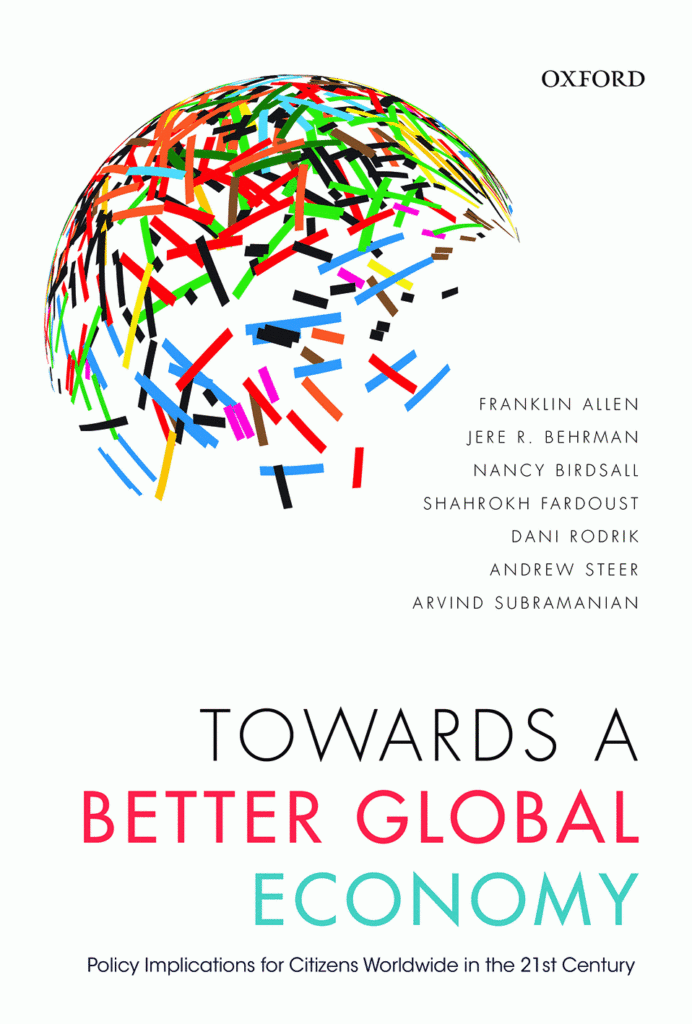This book explores global governance improvements for equitable global welfare, examines economic growth factors across income levels, and addresses challenges like demographic shifts and climate change. Intended for policymakers, scholars, and students.
Franklin Allen, Jere R. Behrman, Nancy Birdsall, Shahrokh Fardoust, Dani Rodrik, Andrew Steer, and Arvind Subramanian

Book Description:
- Analyses how improvements in official global governance can lead to welfare-enhancing and more equitable results for global citizens
- Examines the factors that are most likely to facilitate the process of beneficial economic growth in low-, middle-, and high-income countries
- Includes contributions from leading experts
- Substantial progress in the fight against extreme poverty was made in the last two decades. But the slowdown in global economic growth and significant increases in income inequality in many developed and developing countries raise serious concerns about the continuation of this trend into the 21st century. The time has come to seriously think about how improvements in official global governance, coupled with and reinforced by rising activism of ‘global citizens’ can lead to welfare-enhancing and more equitable results for global citizens through better national and international policies.
This book examines the factors that are most likely to facilitate the process of beneficial economic growth in low-, middle-, and high-income countries. It examines past, present, and future economic growth; demographic changes; the hyperglobalization of trade; the effect of finance on growth; climate change and resource depletion; and the sense of global citizenship and the need for global governance in order to draw longer-term implications, identify policy options for improving the lives of average citizens around the world, and make the case for the need to confront new challenges with truly global policy responses.
The book documents how demographic changes, convergence, and competition are likely to bring about massive shifts in the sectoral and geographical composition of global output and employment, as the center of gravity of the global economy moves toward Asia and emerging economies elsewhere. It shows that the legacies of the 2008-09 crisis-high unemployment levels, massive excess capacities, and high debt levels-are likely to reduce the standard of living of millions of people in many countries over a long period of adjustment and that fluctuations in international trade, financial markets, and commodity prices, as well as the tendency of institutions at both the national and international level to favor the interests of the better-off and more powerful pose substantial risks for citizens of all countries. The chapters and their policy implications are intended to stimulate public interest and facilitate the exchange of ideas and policy dialogue.
Readership: Scholars and students of economics, policy makers, (finance, development, trade ministers, and bank governors); research institutions, think tanks. Advanced undergraduate and first year graduate students studying development economics, globalization studies, and international relations. International financial institutions and regional development banks and journalists and other professionals interested in mega trends affecting global economy and the welfare of average citizens around the world.
Table of contents:
- Jere Behrman and Shahrokh Fardoust: Towards a Better Global Economy: Overview and Policy Options
- Dani Rodrick: The Past, Present, and Future of Economic Growth
Kemal Dervis: Comment
Chang-Tai Hseih: Comment
Branko Milanovic: Comment
Zia Qureshi: Comment - Jere Behrman and Hans-Peter Kohler: Population Quantity, Quality, and Mobility
Ronald Lee: Comment - Arvind Subramanian and Martin Kessler: The Hyperglobalization of Trade and its Future
Bernard Hoekman: Comment - Franklin Allen, Elena Carletti, Jun ‘QJ’ Qian, and Patricio Valenzuela: Does Finance Accelerate or Retard Growth? Theory and Evidence
Stijn Claessens: Comment
Thorsten Beck: Comment - Andrew Steer: Resource Depletion, Climate Change, and Economic Growth
Jeremy Oppenheim: Comment - Nancy Birdsall, with Christian Meyer and Alexis Sowa: Global Markets, Global Citizens, and Global Governance in the 21st Century
Pratap Mehta: Comment

Bibiliographic Information
Print publication date: 2014
Published to Oxford Scholarship Online: November 2014
DPrint ISBN-13: 9780198723455
DOI:10.1093/acprof:oso/9780198723455.001.0001
DOI:10.1093/acprof:oso/9780198723455.001.0001